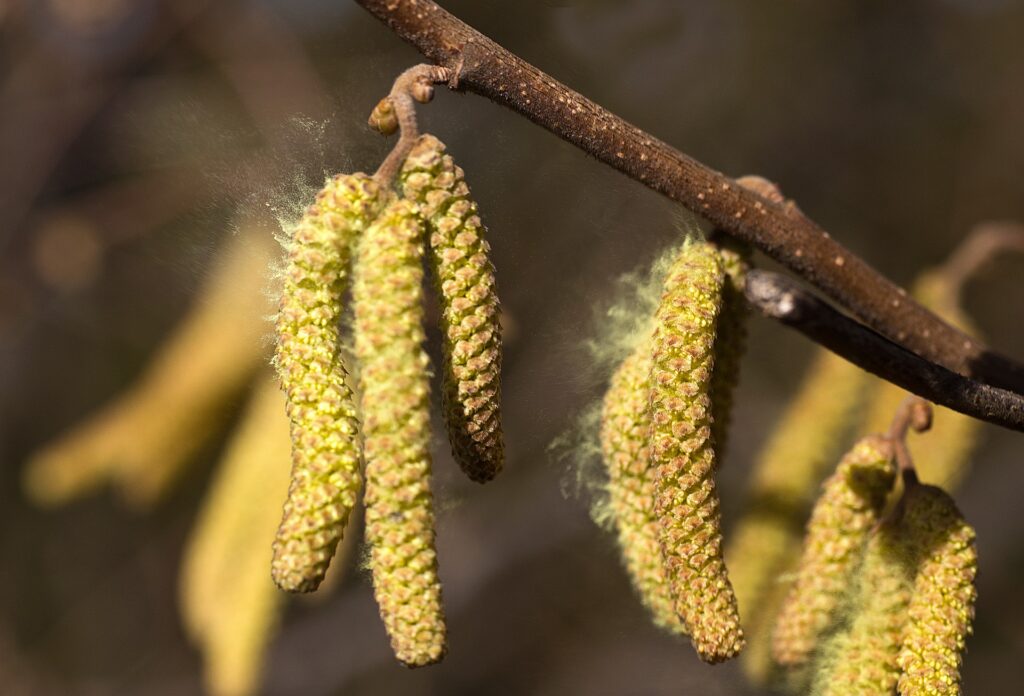
Hay fever – or ‘seasonal allergic rhinitis’ as it is medically known – affects around 15-20% of people in the UK. As well as sneezing, a stuffed-up nose, and itchy eyes and throat, sufferers may experience trouble sleeping, daytime drowsiness, poor concentration, and difficulties carrying out everyday activities.
In the condition an over-sensitive immune system releases the hormone/chemical histamine in an attempt to wash out nontoxic allergens, such as pollens or mould. Unfortunately, a high level of histamine can cause itching, inflammation and congestion, causing more damage to the body than the allergen itself.
The usual treatment is oral antihistamine, available both on prescription and over the counter, but these can cause unwanted side-effects like blurred vision, drowsiness, dizziness, dry mouth, impaired thinking, itchy skin and headaches – even heart muscle damage or dysfunction. Note that very few (if any) have been classified as safe for use during pregnancy.
Alcohol, caffeine, cashew nuts, dairy, fermented foods, meat and sugar, and walnuts – also artificial colouring and sweeteners – all contain high levels of histamine. Stress and anger also encourage high histamine. It is therefore advisable to stick to simple, unprocessed, low histamine, high-fibre foods such as fresh fruit and vegetables, raw nuts and seeds, beans and pulses, and whole grains, and make time to relax and unwind every day.
Below are our favourite natural remedies for hay fever:
Bromelain
This pineapple-derived enzyme reduces levels of inflammatory prostaglandins, a key cause of swelling, redness and itching. It also enhances uptake of quercetin. Avoid if you are allergic to pineapple.
Homeopathic remedies
Safe for use on their own or alongside pharmaceutical preparations, these can alleviate many of the symptoms of hay fever. Note that these can safely be used during pregnancy.
Local raw honey and/or propolis
Many people experience reduction in their hay fever symptoms from enjoying local raw honey and/or propolis.
Magnesium
Researchers found that three bananas contain enough magnesium (180mg) to quell a hay fever attack. Other foods rich in magnesium include almonds, brown rice, kidney beans, lima beans, molasses, peas and wholewheat flour. Magnesium can also be taken as a supplement.
Nettle
According to test-tube studies, nettle extract can inhibit several key inflammatory events in the body that cause symptoms of hay fever. In one clinical trial, 58% of hay fever sufferers rated nettle as effective in relieving their symptoms, while around half found it as or more effective than their previous medication. Nettle tea can also be helpful.
Probiotics
In one study, people taking the antihistamine loratadine, along with supplements containing Lactobacillus paracaseiLP-33, reported a reduction in eye-related symptoms (such as itchy, watery eyes) as well as a boost in quality of life. In another trial, supplementing with Bifidobacterium longum strain BB536 during the (cedar tree) pollen season significantly improved nasal symptoms like sneezing, a runny nose and nasal congestion, compared with a placebo.
Pycnogenol
Derived from the French maritime pine tree, this is a powerful anti-inflammatory and also enhances the action of Vitamin C.
Quercetin
Found in citrus fruits, onions, black tea, apples and lettuce, this powerful plant pigment suppresses the release of histamine, which contributes to symptoms like a runny nose and watery eyes. Almost twice as effective as the histamine-inhibiting drug sodium cromoglycate in laboratory studies, it reduced histamine activity by an impressive 46-96%.
Vitamin C
Vitamin C is a natural histamine suppressor. In one study, 2g/day of Vitamin C lowered blood histamine levels by nearly 40% in just one week. In another study, Vitamin C sprayed up the nose three times a day reduced allergy symptoms (runny nose, stuffiness, swelling) in 74% of sufferers, compared with only 24% with a placebo.
Healthright’s aim for 2021 is to help you improve your immune system naturally and safely.
Come and ask us how. We look forward to seeing you again very soon.
